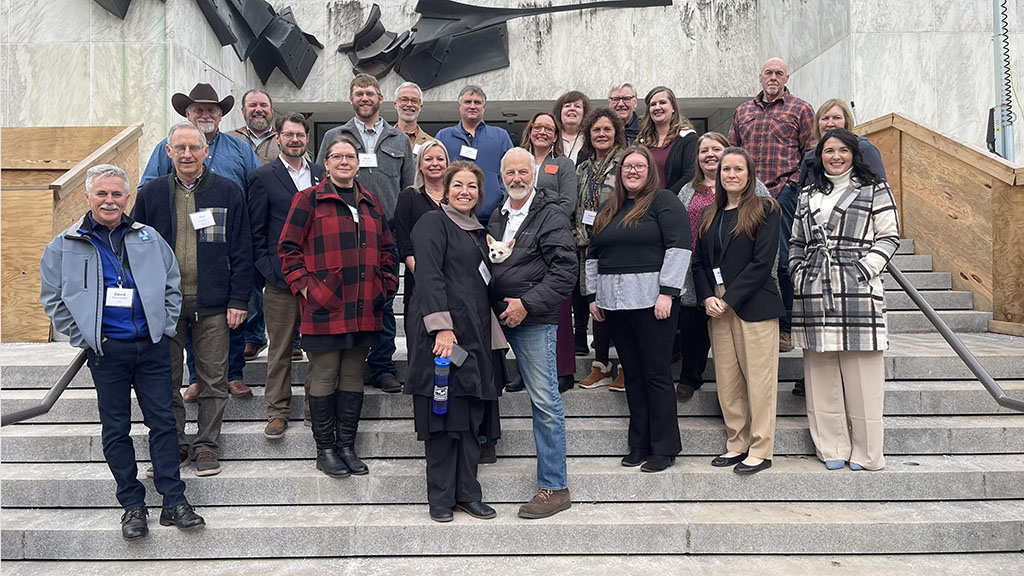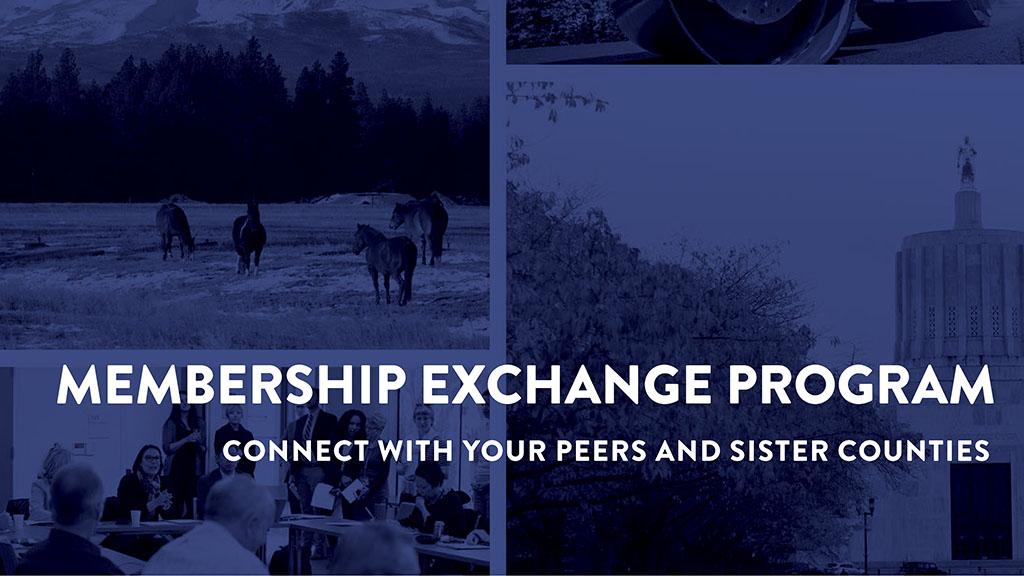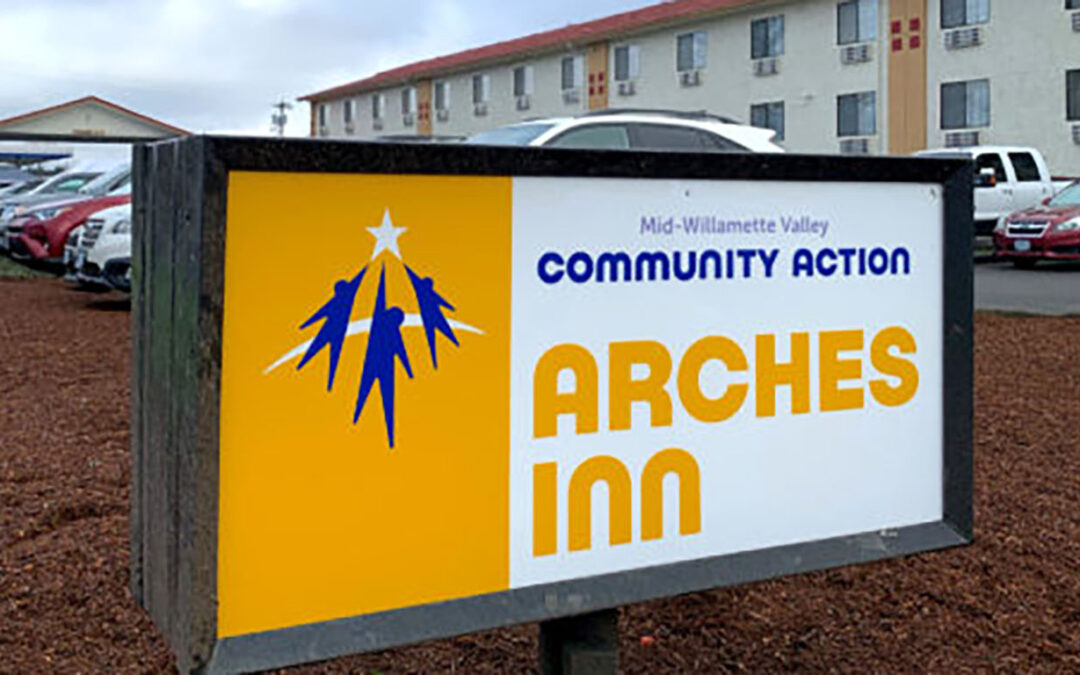
Jun 16, 2023 | AOC News
On June 16, the Association of Oregon Counties (AOC) celebrated the graduation of twenty-four students from diverse backgrounds including County commissioners, judges, staff, and OSU Extension staff.
The County College program, sponsored by CIS and Oregon State University (OSU) Extension, began in 2006 in partnership with the OSU Extension Service, and for four years, ran every year. Since the 2009 class, it has run every other year in odd years. Designed primarily for new commissioners, judges, chairs, and high-level staff, the program offers a comprehensive overview of the responsibilities and authorities of a county, and a county commissioner, judge, or chair, including legal, government ethics, public meetings and records, parliamentary procedure, and much more.
Over six months, County College participants engaged in over 80 hours of educational programming from over 75 content experts and thought leaders. In addition, they gained hands-on experience with tours at the OSU, Oregon Forest Science Complex, the Oregon State Hospital Museum, the Marion Resource Recovery Facility, and the Marion County Public Works Facility.
In November, the 2023 County College class will come together again for a formal graduation ceremony as part of the 2023 AOC Annual Conference Opening General Session at the Graduate Eugene.
Congratulations to the Graduates of the 2023 County College Program:
- Chair Shane Alderson, Baker County
- Commissioner Christina Witham, Baker County
- Commissioner Kellie Jo Smith, Columbia County
- Commissioner Rod Taylor, Coos County
- Nikkol Taylor, Coos County
- Commissioner Brad Alcorn, Curry County
- Commissioner Jonathan Trost, Curry County
- Assistant to the County Commissioners/ Employee Resources Officer Miranda Rees, Gilliam County
- Commissioner Leah Watkins, Gilliam County
- Executive Assistant to the County Judge Delaney Watkins, Gilliam County
- Judge William Hart, Harney County
- Commissioner Mark Wunsch, Jefferson County
- Legal Secretary Kassie Austin, Josephine County
- Commissioner David Loveall, Lane County
- Commissioner David Sykes, Morrow County
- Commissioner Jeff Wenholz, Morrow County
- Commissioner Roy Drago, Morrow County
- Regional Director Nicole Strong, OSU Extension / AOC Districts 2 and 3
- Local Liaison Laura Corder, OSU Extension / Douglas County
- Service District Administrator Tammi Gaskey, Sherman County
- Commissioner Cindy Timmons, Umatilla County
- Commissioner Phil Brady, Wasco County
- Administrative Services Director Ali Postlewait, Wasco County
- Commissioner Kit Johnston, Yamhill County
View the entire 2023 county college program curriculum and agendas here.
Contributed by Kristen Paul, AOC public affairs associate

Jun 15, 2023 | AOC News
The mission of the Housing Stability Council is to provide leadership in, and review and set policy for, the development and financing of affordable housing throughout the state of Oregon.
The nine-member council meets monthly and additionally as needed to:
- Help establish strategic direction and a policy framework for OHCS.
- Set policy for and issue decisions regarding loans, grants, and funding awards.
- Help the director foster constructive partnerships with other state agencies and key partners engaged in housing and community services, and more.
Click here to view the Scouncil’s charter for a complete understanding of the Housing Stability Council’s duties.
Interested individuals can learn more and apply online before June 30.
Contributed by: Jessica Pratt, AOC legislative affairs manager

Jun 14, 2023 | AOC News, Member Services
The Association of Oregon Counties (AOC) Membership Committee is excited to announce that applications are now open for the 2023-2024 AOC Membership Exchange Program.
The application process includes a quick, five-minute survey to help identify which counties you are interested in learning more about and what you hope to share about your county with your colleagues.
Based on the application information, applicants will be placed in pairs or small groups and encouraged to plan county visits to get on the ground exposure to county successes, projects, and programs across diverse geographic regions and county structures.
Introduced in 2021 by the AOC Membership Committee, the AOC Membership Exchange Program was created to support AOC’s purpose to unite and advance county issues, foster trust in county government, and develop programs and services that support the success of counties into the future. Since inception, over 20 participants representing 16 counties, have planned exchange visits across the state.
Learn more about the program timeline and apply today on the program’s webpage. The applications portal will close on Friday, July 7 at 12:00 midnight PDT.
Contributed by Kristen Paul, AOC public affairs associate

Jun 14, 2023 | AOC Advocacy, AOC News, Natural Resources
The Association of Oregon Counties (AOC) has continuously engaged with the legislature, state agencies, and stakeholders in the development of comprehensive wildfire policies for numerous sessions. By focusing on thoughtful, effective, and regionally tailored wildfire policy, AOC has been able to ensure the county perspective is not only at the negotiating table but included in the implementation of statewide policy on wildfire.
Senate Bill 80B (2023) makes many technical changes to the 2021 Wildfire bill, SB 762, including revisiting the statewide wildfire risk map. Based on AOC Natural Resources Steering Committee principles and discussions, AOC staff and steering committee chairs worked with bill sponsor Senator Jeff Golden (D-Ashland), the Oregon Department of Forestry (ODF), and Wildfire Program Advisory Council Chair Mark Bennett and Director Doug Grafe on statutory changes with the goal of an improved statewide wildfire hazard map.
Upon passage of SB 80, statute now requires that, “to ensure local characteristics in each area of this state are considered in the mapping process and before the draft map is released, the department shall meet with county commissioners and their staff in eight in-person meetings throughout this state.”
The bill goes on to say that after those meetings occur and the map is released for public comment, counties will have one additional opportunity to meet with ODF to discuss additional concerns and potential changes to the map. This process must be “interactive and does not consist solely of delivering information in a top-down manner.”
Finally, to ensure that counties have an active role in the wildfire mapping process, ODF stated on the legislative record that, “The department will receive and consider all comments and concerns for integration into the map, and if they are not integrated, an explanation on why will be provided.”
These county-ODF meetings will be scheduled in coordination with the AOC District Meetings this fall. AOC staff is meeting with county planning directors in advance of the fall ODF meetings to ensure counties are prepared to engage meaningfully in the map review process.
“We look forward to meeting with county commissioners and staff as we put the Wildfire Hazard Map together later this year,” said Cal Mukumoto, Oregon State Forester. “Through working together with counties we were able to craft language that works for both parties. Knowing the local concerns and issues faced in specific areas will help us make a map that is beneficial statewide.”
Contributed by: Branden Pursinger, AOC legislative affairs manager

Jun 2, 2023 | AOC News
There has been a lot of talk about housing as the Kotek Administration prioritizes solutions to the state’s housing crisis. Project Turnkey, an Association of Oregon Counties (AOC) supported program, is one of several models being deployed to provide targeted solutions tailored to community needs.
Last month, Oregon Governor Tina Kotek joined Polk County Commissioner Jeremy Gordon, AOC Executive Director Gina Firman Nikkel, and community leaders for the ribbon cutting of the Project Turnkey property, ARCHES Lodge in northeast Salem.
ARCHES Inn, a former hotel, was purchased by Mid-Willamette Valley Community Action Agency (MWVCAA) using grant funding from several sources, including $3.5 million from the second tranche of Project Turnkey’s investment from the state. The region has identified veterans and people with acute health needs, including unsheltered people being released from clinics or emergency rooms, as its priority population for shelter and services.
True to the intent of the program, each local community focuses on specific housing and services tailored to the needs of their guests. Some recipients of the funds used the program to uplift community members impacted by wildfire, some for those transitioning following substance use recovery, some for transitional housing for youth, and some for survivors of domestic violence.
Since 2020, the State Legislature has invested close to $125 million in Project Turnkey. In the first tranche of funding, the program added nearly 900 units of shelter for Oregonians in need through the conversion of 19 motel sites in 13 counties around the state. In the second tranche of funding, which is being deployed through June of 2023, it is expected that an additional 500 units of shelter will be created.
“Project Turnkey was really a culmination of the pandemic, wildfire, and general housing crisis in Oregon. And, with my background in mental health, and the work that counties do to support our residents through wraparound services, it was clear that housing was one of the first critical steps in addressing mental health needs for Oregonians,” Nikkel said.
Following that conversation, AOC formed and co-convened a workgroup with the League of Oregon Cities (LOC), inviting legislators and other housing stakeholders to the table to identify how to achieve solutions that best served Oregonians. Oregon Community Foundation (OCF) staff engaged in the convening and feasibility study of the model. Ultimately, OCF served as fiduciary and grant administrator for the implementation of the program. This group worked closely with Kotek, who, at the time, served as Speaker of the House, for the initial investment in the program.
Nikkel is grateful for the governor’s engagement with the program. “Governor Kotek was a strong advocate for the program in her tenure as Speaker of the House and now as governor. She continues to be a strong partner for counties.”
With the strong success in the first phase of the program, Project Turnkey saw an infusion of $50 million more from the state in 2022. Organizations around the state applied for the opportunity to purchase motels, hotels, and other existing structures and utilize them short-term as shelter or temporary housing. Longer term, the properties may convert to permanent housing as the local housing needs shift and evolve.
OCF, the administrator of Project Turnkey, is continuing its work, guided by a statewide Advisory Committee. The second tranche of $50 million in funding is being awarded to new sites around the state, and in alignment with legislative direction for the funds, all acquisitions will be completed by June 30, 2023.
Eligible property types include hotels, motels, and other vacant properties that can readily and affordably be converted to non-congregate shelter such as duplexes, apartment complexes, care facilities, or dormitories.
Nikkel serves on the Advisory Committee that reviews Project Turnkey applications and recommends awardees for funding. She said the second tranche of funding brought 32 applications from regions around the state.
“The need for housing is great, and while Project Turnkey is one of several pieces needed to address the housing crisis, it is not the only set of housing we need, Nikkel stated. We need people to move up – from shelter beds to middle housing, and so on.”
There was no direct request for funding for the 2023 Legislative Session, but conversations continue. Nikkel met with Kotek in early April and discussed the success of the program.
As Project Turnkey properties launch in communities around the state, counties are working with community partners to provide wraparound services to program participants. Each site is uniting community partners to offer the right resources to each guest to help them stabilize and move to permanent housing.
AOC, LOC, and partners continue to convene to address future housing solutions. Partners include: CASA of Oregon; Hacienda CDC; Network for Oregon Affordable Housing; Oregon Emergency Management; Oregon Community Foundation, Oregon Health Authority; Oregon Housing and Community Services; Oregon Restaurant and Lodging Association; Oregon Community Foundation; Oregon Housing Stability Council Chair and Lincoln County Commissioner Claire Hall; former Morrow County Commissioner Jim Doherty; State Representative Pam Marsh (D-Ashland); and former State Representative Alissa Keny-Guyer (D-Portland).
Contributed by: Mckenzie Farrell, AOC operations director





